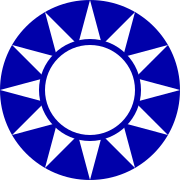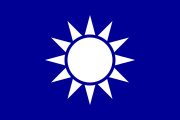
Back Kuomintang Afrikaans الكومينتانغ Arabic الكومينتانج ARZ Kuomintang AST Homindan Azerbaijani Kuomintang BCL Гаміньдан Byelorussian Гоминдан Bulgarian Kuomintang Breton Kuomintang BS
Kuomintang 中國國民黨 Zhōngguó Guómíndǎng Chungkuo Kuomintang | |
|---|---|
 | |
| Other name | Chinese Nationalist Party[1] |
| Abbreviation | KMT |
| Chairman | Eric Chu |
| Secretary-General | Justin Huang |
| Founded | 10 October 1919 Shanghai French Concession |
| Preceded by |
|
| Headquarters | No. 232–234, Sec. 2, Bade Rd., Zhongshan District, Taipei City 104, Taiwan[2] |
| Newspaper | Central Daily News |
| Think tank | National Policy Foundation |
| Youth wing | Kuomintang Youth League Three Principles of the People Youth League (1938–1947) |
| Education wing | Institute of Revolutionary Practice |
| Military wing | National Revolutionary Army (1925–1947) |
| Paramilitary wing | Blue Shirts Society (1932–1938)[3] |
| Overseas wing | Overseas branches |
| Membership (2021) | |
| Ideology | |
| Political position | Centre-right[5] to right-wing[6] Historical: Big tent[7][8] |
| National affiliation | Pan-Blue Coalition[9] |
| Regional affiliation | Asia Pacific Democrat Union |
| International affiliation | |
| Colours | Blue |
| Anthem | "Three Principles of the People" |
| Legislative Yuan | 52 / 113 |
| Municipal mayors | 4 / 6 |
| Magistrates/mayors | 10 / 16 |
| Councillors | 367 / 910 |
| Township/city mayors | 83 / 204 |
| Party flag | |
 | |
| Website | |
| www | |
| Kuomintang | |||||||||||||||||||||||||||||||||||||||||||||
|---|---|---|---|---|---|---|---|---|---|---|---|---|---|---|---|---|---|---|---|---|---|---|---|---|---|---|---|---|---|---|---|---|---|---|---|---|---|---|---|---|---|---|---|---|---|
 "Kuomintang (Guómíndǎng)" in Traditional (top) and Simplified (bottom) Chinese characters | |||||||||||||||||||||||||||||||||||||||||||||
| Chinese name | |||||||||||||||||||||||||||||||||||||||||||||
| Traditional Chinese | 中國國民黨 | ||||||||||||||||||||||||||||||||||||||||||||
| Simplified Chinese | 中国国民党 | ||||||||||||||||||||||||||||||||||||||||||||
| Literal meaning | Chinese Nationals' Party | ||||||||||||||||||||||||||||||||||||||||||||
| |||||||||||||||||||||||||||||||||||||||||||||
| Abbreviation | |||||||||||||||||||||||||||||||||||||||||||||
| Traditional Chinese | 國民黨 | ||||||||||||||||||||||||||||||||||||||||||||
| Simplified Chinese | 国民党 | ||||||||||||||||||||||||||||||||||||||||||||
| Literal meaning | Nationals' Party | ||||||||||||||||||||||||||||||||||||||||||||
| |||||||||||||||||||||||||||||||||||||||||||||
| Tibetan name | |||||||||||||||||||||||||||||||||||||||||||||
| Tibetan | ཀྲུང་གོའི་གོ་མིན་ཏང | ||||||||||||||||||||||||||||||||||||||||||||
| |||||||||||||||||||||||||||||||||||||||||||||
| Zhuang name | |||||||||||||||||||||||||||||||||||||||||||||
| Zhuang | Cunghgoz Gozminzdangj | ||||||||||||||||||||||||||||||||||||||||||||
| Mongolian name | |||||||||||||||||||||||||||||||||||||||||||||
| Mongolian Cyrillic | Дундадын (Хятадын) Гоминдан (Хувьсгалт Нам) | ||||||||||||||||||||||||||||||||||||||||||||
| Mongolian script | ᠳᠤᠮᠳᠠᠳᠤ ᠶᠢᠨ (ᠬᠢᠲᠠᠳ ᠤᠨ) ᠭᠣᠮᠢᠨᠳᠠᠩ (ᠬᠤᠪᠢᠰᠬᠠᠯᠲᠤ ᠨᠠᠮ) | ||||||||||||||||||||||||||||||||||||||||||||
| |||||||||||||||||||||||||||||||||||||||||||||
| Uyghur name | |||||||||||||||||||||||||||||||||||||||||||||
| Uyghur | جۇڭگو گومىنداڭ | ||||||||||||||||||||||||||||||||||||||||||||
| |||||||||||||||||||||||||||||||||||||||||||||
| Manchu name | |||||||||||||||||||||||||||||||||||||||||||||
| Manchu script | ᠵᡠᠩᡬᠣ ᡳ ᡬᠣᠮᡳᠨᡩᠠᠩ | ||||||||||||||||||||||||||||||||||||||||||||
| Romanization | Jungg'o-i G'omindang | ||||||||||||||||||||||||||||||||||||||||||||
 |
|---|
|
|
 |
|---|
|
|
The Kuomintang (KMT),[I] also referred to as the Guomindang (GMD),[11] the Nationalist Party of China (NPC)[12] or the Chinese Nationalist Party (CNP),[1] is a major political party in the Republic of China, initially based on the Chinese mainland and then in Taiwan since 1949. The KMT is a centre-right to right-wing party and the largest in the Pan-Blue Coalition. Its primary rival is the Democratic Progressive Party (DPP) and its allies in the Pan-Green Coalition. As of 2024, the KMT is the largest single party in the Legislative Yuan. The current chairman is Eric Chu.
The party originated as the Revive China Society, founded by Sun Yat-sen in 1894 in Honolulu. The party underwent reorganization before and after the 1911 Xinhai Revolution, which resulted in the collapse of the Qing dynasty and establishment of the Provisional Republic Government, with Sun as the first president. In 1919, Sun re-established the party under the name "Kuomintang" in the Shanghai French Concession. From 1926 to 1928, the KMT under Chiang Kai-shek successfully led the Northern Expedition against regional warlords and unified the fragmented nation. KMT was the sole ruling party in China during the Republican Era from 1928 to 1949, when most of the Chinese mainland was under its control. The party retreated to Taiwan in December 1949, following its defeat in the Chinese Civil War.
From 1949 to 1987, the KMT ruled Taiwan as an authoritarian one-party state after the February 28 incident. During this period, martial law was in effect and civil liberties were curtailed as part of its anti-communism efforts, with the period known as the White Terror. The party oversaw Taiwan's economic development, but experienced diplomatic setbacks, including the ROC losing its United Nations seat and most countries including, its ally the US, switching diplomatic recognition to the CCP-led People's Republic of China (PRC) in the 1970s. In the late 1980s, Chiang Ching-kuo, Chiang Kai-shek's son, lifted martial law and the ban on opposition parties. His successor Lee Teng-hui continued democratic reforms and was re-elected in 1996 through a direct presidential election, the first time in the ROC history. The 2000 presidential election ended 72 years of KMT's dominance in the ROC. The KMT reclaimed power from 2008 to 2016, with the landslide victory of Ma Ying-jeou in the 2008 presidential election, whose presidency significantly loosened restrictions on economic and cultural exchanges with the People's Republic of China. The KMT lost the presidency and its legislative majority in the 2016 election.
The KMT is a member of the International Democracy Union. The party's guiding ideology is the Three Principles of the People, advocated by Sun Yat-sen and historically organized on a basis of democratic centralism, a principle conceived by revolutionary Vladimir Lenin that entailed open discussion of policy on the condition of unity among party members in upholding agreed decisions. The KMT opposes de jure Taiwan independence, Chinese unification under the "one country, two systems" framework, and non-peaceful means to resolve the cross-strait disputes. Originally placing high priority on reclaiming the Chinese mainland through Project National Glory, the KMT now favors a closer relation with the PRC and seeks to maintain Taiwan's status quo under the Constitution of the Republic of China. The party accepts the 1992 Consensus, which defines both sides of the Taiwan Strait as "one China", but maintains its ambiguity to different interpretations.
- ^ a b "Taiwan – The World Factbook". www.cia.gov. Archived from the original on 9 January 2021. Retrieved 11 July 2021.
- ^ "Kuomintang Official Website". Kuomintang. Archived from the original on 3 July 2015. Retrieved 13 September 2011.
- ^ Wakeman, Frederic (2003). "Ideological Rivalries: The Blue Shirts and the "CC" Clique". In Wakeman, Frederic (ed.). Spymaster: Dai Li and the Chinese Secret Service. University of California Press. pp. 98–109. doi:10.1525/california/9780520234079.003.0009. ISBN 978-0-520-23407-9.
- ^ "朱立倫當選國民黨主席!熱戰21天 奪8.5萬票力壓張亞中勝出". The Storm Media. Retrieved 24 May 2023.
- ^
- "New face for KMT in Taiwan". The Australian. Archived from the original on 9 January 2021. Retrieved 26 December 2019.
The problems for the centre-right KMT in retaining the presidency over the centre-left DPP...
- Qi, Dongtao (11 November 2013). "Globalization, Social Justice Issues, Political and Economic Nationalism in Taiwan: An Explanation of the Limited Resurgence of the DPP during 2008–2012". The China Quarterly. 216: 1018–1044. doi:10.1017/S0305741013001124. S2CID 154336295.
Furthermore, the studies also suggest that the DPP, as a centre-left party opposed to the centre-right KMT, has been the leading force in addressing Taiwan's various social justice issues.
- Shim, Jaemin (2018). "Mind the Gap! Comparing Gender Politics in Japan and Taiwan". GIGA Focus | Asia (5). German Institute for Global and Area Studies. Archived from the original on 26 December 2019. Retrieved 26 December 2019.
- "New face for KMT in Taiwan". The Australian. Archived from the original on 9 January 2021. Retrieved 26 December 2019.
- ^
- Fell, Dafydd (2005). Party Politics in Taiwan: Party Change and the Democratic Evolution of Taiwan, 1991–2004. Routledge. pp. 98, 117. ISBN 1-134-24021-X.
- Rigger, Shelley (2016). "Kuomintang Agonistes: Party Politics in the Wake of Taiwan's 2016 Elections". Orbis. 60 (4): 408–503. doi:10.1016/j.orbis.2016.08.005. Archived from the original on 9 January 2021. Retrieved 27 May 2020.
Instead of reshaping its priorities to fit the expectations of a changing society, the KMT (at least for the moment) seems to be doubling down on its self-marginalizing approach. The new party chair is Hung Hsiu-chu, the erstwhile presidential candidate whose far-right views made it necessary to replace her.
- Yoshiyuki Ogasawara (12 December 2019). "Taiwan's 2020 Presidential Elections". The Diplomat. Archived from the original on 1 September 2022. Retrieved 12 February 2021.
These supporters, called 'Han maniacs,' elevated Han to presidential nominee. Ultimately, though, they were a minority, possibly some twenty percent of the overall electorate, and Han's political position, friendly to Beijing and inclined to right-wing populism, started to erode his support.
- ^ Congress, United States (19 April 1947). "Congressional Record: Proceedings and Debates of the ... Congress". U.S. Government Printing Office. Archived from the original on 14 April 2023. Retrieved 19 April 2021 – via Google Books.
- ^ Laws, United States Congress Senate Committee on the Judiciary Subcommittee to Investigate the Administration of the Internal Security Act and Other Internal Security (19 April 1970). "The Amerasia Papers: A Clue to the Catastrophe of China". U.S. Government Printing Office – via Google Books.
- ^ M. Troy Burnett, ed. (2020). Nationalism Today: Extreme Political Movements around the World [2 volumes]. ABC-CLIO. p. 201. ISBN 978-1-4408-5000-4. Archived from the original on 14 April 2023. Retrieved 2 July 2022.
The center-right Pan-Blue Coalition, led by the KMT, maintains that the ROC is the sole legitimate government for all of China (including Taiwan) and that the aim of the government should be the eventual reunification of the mainland ...
- ^ "Members". IDU. Archived from the original on 16 July 2015.
- ^ "Brill's Encyclopedia of China". referenceworks.brillonline.com. 10 November 2008. Archived from the original on 26 November 2021. Retrieved 26 November 2021.
- ^ "Wishing China's Communist Party a happy birthday". 28 June 2021. Archived from the original on 7 July 2021. Retrieved 8 December 2022.
Cite error: There are <ref group=upper-roman> tags on this page, but the references will not show without a {{reflist|group=upper-roman}} template (see the help page).
© MMXXIII Rich X Search. We shall prevail. All rights reserved. Rich X Search
